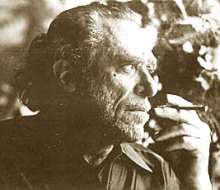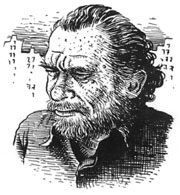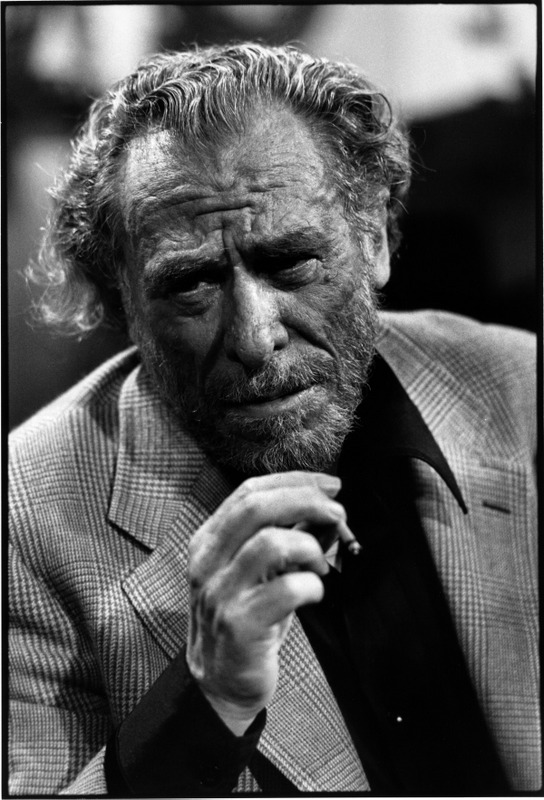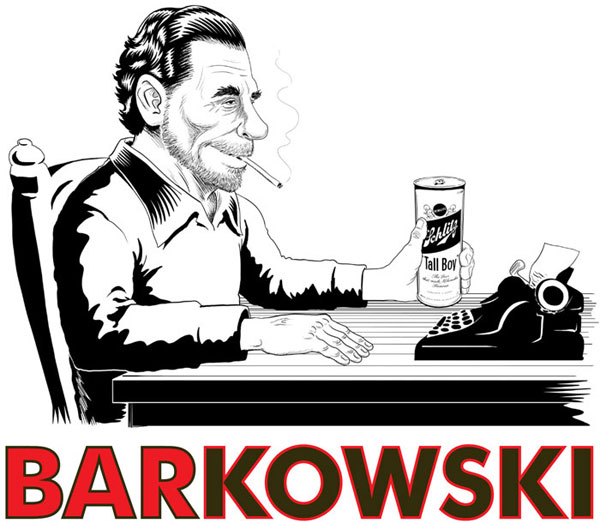A Phlit subscriber in Ohio, Sean Pendleton, recently introduced me to a contemporary American writer named Charles Bukowski (1920-1994). Perhaps the best introduction to Bukowski is this one-minute video of him reading his poem “Bluebird.” Bukowski has been called “the laureate of American lowlife.” He often writes about his own experiences — cigarettes, alcohol, bars, brawls, menial jobs, etc. He has the vitality, the passion, the honesty that’s characteristic of genius.
I first became interested in Bukowski after reading this poem:
so you want to be a writer?
if it doesn’t come bursting out of you
in spite of everything,
don’t do it.
unless it comes unasked out of your
heart and your mind and your mouth
and your gut,
don’t do it....
unless it comes out of
your soul like a rocket,
unless being still would
drive you to madness or
suicide or murder,
don’t do it.
Bukowski’s gravestone reads “Don’t Try,”
| a phrase which Bukowski uses in one of his poems.... Bukowski explained the phrase in a 1963 letter... “Somebody [asked me]: ‘What do you do? How do you write, create?’ You don’t, I told them. You don’t try. That’s very important: not to try, either for Cadillacs, creation or immortality. You wait, and if nothing happens, you wait some more. It’s like a bug high on the wall. You wait for it to come to you. When it gets close enough you reach out, slap out and kill it. Or if you like its looks you make a pet out of it.” |

Bukowski writes about the plethora of writers:
| Almost everybody was a writer. Not everybody thought they could be a dentist or an automobile mechanic but everybody knew they could be a writer. Of those fifty guys in the room, probably fifteen of them thought they were writers. Almost everybody used words and could write them down, i.e., almost everybody could be a writer. |
I thought Nietzsche had written eloquently about solitude, but Bukowski may surpass him:
| I got into bed, opened the bottle, worked the pillow into a hard knot behind my back, took a deep breath, and sat in the dark looking out of the window. It was the first time I had been alone for five days. I was a man who thrived on solitude; without it I was like another man without food or water. Each day without solitude weakened me. I took no pride in my solitude; but I was dependent on it. The darkness of the room was like sunlight to me. I took a drink of wine. |
Unlike most poets, Bukowski took both pleasure and pride in fist-fights. He said that the local bartender called him “a good duker,” which he regarded as a high compliment. “For a long time,” Bukowski said, “I had a heavy suicide complex. I went to bars to try to fight, try to get killed.”1 Once someone pulled a gun on him, and threatened to shoot him. Bukowski calmly explained that he was suicidal anyway, and murder would lead to a long jail term. The man dropped his gun and left hastily.
Bukowski moves easily between the sordid and the sublime. Some of his aphorisms are immortal. “The free soul is rare,” Bukowski wrote, “but you know it when you see it — basically because you feel good, very good, when you are near or with them.”
Bukowski’s childhood wasn’t a happy one. He said that his father beat him regularly with a razor strop. (When Hemingway was asked, What’s the best early training for a writer? he responded, “An unhappy childhood.”) Bukowski was the right age to serve in World War II, but when he had a psychological evaluation, he was declared unfit to serve. Perhaps, like many geniuses, he was on the border of sanity and insanity.
The young Bukowski had severe acne, which left him permanently scarred. He discovered alcohol in his early teens, and seemed to think that it was the best way to cope with life. He was a heavy drinker, and a smoker, for most of his life.

Bukowski spent most of his life in Los Angeles, and knew it thoroughly. For many years, he worked at the post office, and his first novel was called Post Office. “I couldn’t help thinking, god, all these mailmen do is drop in letters and get laid. This is the job for me, oh yes yes yes.”2 He wrote both poetry and fiction. His poetry is probably more popular than that of any contemporary American poet. He’s popular abroad as well as in the U.S. Perhaps one reason for his popularity is that he isn’t obscure. As he himself said, “My writing is very simple. Maybe clarity is a better word.”3
The New Yorker published an essay on Bukowski, calling him
| the man who occupies the most shelf space of any American poet.... a poet who has sold millions of books and has been translated into more than a dozen languages — a commercial success of a kind hardly known in American poetry since the pre-modernist days of popular balladeers.... His own life, as it appears in the poems, at least, is a teen-age boy’s fantasy of adulthood, in which there’s no one to make you clean up your room, or get out of bed in the morning, or stop drinking before you pass out. |
In several respects, Bukowski reminds me of Eric Hoffer — the rough life, the California setting, the genius, the celebrity. “In the 1980s [Bukowski] collaborated with illustrator Robert Crumb on a series of comic books, with Bukowski supplying the writing and Crumb providing the artwork.”4 Bukowski was a fan of Schopenhauer; perhaps Schopenhauer’s pessimism struck a chord with him.

Crumb’s drawing of Bukowski

An interview with Bukowski (cartoon by Crumb)
In 1969, Bukowski left the post office because a man named John Martin offered him $100 a month for the rest of his life, if he would publish his works with him (they settled on $100 a month because that’s what Bukowski thought he needed to live on). Martin thought that Bukowski was the Whitman of our time. Bukowski’s books sold well, and the partnership between Bukowski and Martin became profitable for both men.
To make money, Bukowski gave many public readings. “Drinking was often a featured part of the readings, along with a combative banter with the audience.”5 He didn’t enjoy these readings, and gave them up when he no longer needed the money.

On the French TV show Apostrophes
“Charles Bukowski’s appearance on the show (22 September 1978)
is famous for his being visibly drunk, insulting the host
and walking off in the midst of the broadcast”
Bukowski writes about his own success and fame:
there were these people
on the ground,
they were reaching up their
arms and trying to pull me
down
but
they couldn’t do
it.
I felt like pissing on
them.
they were so
jealous.
all they had to do was
to work their way
slowly up to it
as I had
done.
such people think
success grows on
trees.
you and I,
we know
better.
Several films are based on Bukowski’s life, and several more films are based on his works. Bono was a fan of Bukowski, Sean Penn was both a fan and a friend. I enjoyed a documentary called Bukowski: Born Into This, which I found on Netflix. Bukowski wrote the screenplay for a movie called Barfly, which deals with his own life. The experience of making this movie prompted Bukowski to write Hollywood, which takes a critical view of the film industry.
There’s a Bukowski-themed bar in Santa Monica called Barkowski.

When I mentioned Bukowski to Elliott Banfield, he responded,
| You should read his novel Ham on Rye, if you’ve not done so. It’s autobiographical, and fun to read. There was something very appealing in Bukowski’s personality, despite his anti-social tendencies. The reader has to take his side.6 |
Bukowski writes about the various jobs he’s had:
| They wouldn’t fire me. Even the salesmen liked me. They were robbing the boss out the back door but I didn’t say anything. That was their little game. It didn’t interest me. I wasn’t much of a petty thief. I wanted the whole world or nothing. |
He often writes about the working-man’s world:
| I couldn’t get myself to read the want ads. The thought of sitting in front of a man behind a desk and telling him that I wanted a job, that I was qualified for a job, was too much for me. Frankly, I was horrified by life, at what a man had to do simply in order to eat, sleep, and keep himself clothed. So I stayed in bed and drank. When you drank the world was still out there, but for the moment it didn’t have you by the throat. |
The working life that Bukowski describes is a grim life:
| How in the hell could a man enjoy being awakened at 6:30 a.m. by an alarm clock, leap out of bed, dress, force-feed, shit, piss, brush teeth and hair, and fight traffic to get to a place where essentially you made lots of money for somebody else and were asked to be grateful for the opportunity to do so? |
The best job is no job: “Any damn fool can beg up some kind of job; it takes a wise man to make it without working.”
Bukowski’s sentences are always well crafted: “I’m no preacher but I can tell you this — the lives that people lead are driving them crazy and their insanity comes out in the way they drive.”
Bukowski’s writing is vivid and honest, and it often seems to come from hard experience: “Once a woman turns against you, forget it. They can love you, then something turns in them. They can watch you dying in a gutter, run over by a car, and they’ll spit on you.”
On self-deprecation: “If I’m an ass, I should say so. If I don’t, somebody else will. If I say it first, that disarms them.”

The quote closely resembles a passage in Nietzsche
A. I discovered a Scottish writer named Allan Massie. Massie wrote some popular historical novels about Roman leaders — Augustus, Antony, Caligula, etc. Gore Vidal called Massie a “master of the long-ago historical novel.” Massie also wrote books on Scottish cities — Edinburgh, Glasgow, Aberdeen. Massie is conservative in both his political opinions and his literary opinions. He’s an admirer of Walter Scott, and past president of the Scott Club.
B. Allan Massie shouldn’t be confused with Robert K. Massie, an American who “devoted much of his career to studying the House of Romanov, Russia’s royal family from 1613 to 1917.” Robert K. Massie is best known for Nicholas and Alexandra, a biography of Nicholas II and Alexandra of Hesse, the last Emperor and Empress of Russia. This book was the basis of an award-winning film of the same title. In 1981, Massie won a Pulitzer Prize for Peter the Great: His Life and World, which inspired a 1986 NBC miniseries, also called Peter the Great. Massie wrote two books about World War I naval history. I strongly recommend Brian Lamb’s one-hour interview with Massie.
If you’re interested in Russian history, you might enjoy The Education of a Princess, a memoir by the Czar’s cousin, published in 1930. It was a bestseller in its day. The sequel is called A Princess in Exile. Consider also the popular history of Russia by Nicholas Riasanovsky. Riasanovsky taught at Berkeley for forty years.
C. William Taubman, who was a professor at Amherst College, wrote biographies of Khrushchev and Gorbachev. His Khrushchev biography won a Pulitzer Prize in 2004. Here are links to interviews with Taubman:
D. Ancient Rome has long been a popular subject with novelists. Three of the most popular novels of the 19th century were set in ancient Rome:
- Lew Wallace, an American, wrote Ben-Hur (1880), which sold even more copies than Gone with the Wind
- The Polish novelist Henryk Sienkiewicz wrote Quo Vadis (1895), which has been translated into more than 50 languages. Like Ben-Hur, Quo Vadis takes a favorable view of Christianity
- The English novelist Edward Bulwer-Lytton wrote The Last Days of Pompeii (1834). One character in this novel, the Witch of Vesuvius, shows Bulwer-Lytton’s interest in the occult. Later he wrote Vril, the Power of the Coming Race (sometimes called The Coming Race), which explores occult themes further.
E. The Dennis Hastert scandal reminds me of an Ibsen play: a pillar of the community is destroyed when a secret crime from the distant past comes to light. Ibsen was an avid newspaper-reader, and often got plot-ideas from the newspaper. Hastert’s crimes may help to explain why he left a good job, and a respected position in the community: he retired from teaching/coaching because it exposed him to temptations that he could neither resist nor indulge. In an earlier issue, I wrote,
| What conclusion should we draw from the recent scandals of Anthony Weiner, Herman Cain, Dominique Strauss-Kahn, Arnold Schwarzenegger, and Silvio Berlusconi (and the older scandals of Bill Clinton, JFK, etc.)? It seems that, in modern democracies, the men who enter politics, and succeed in politics, are long on charm but short on conscience; they’re warm, sociable, and likable, but have a weak super-ego. |
F. I’m obsessed by the recent escape from a prison in upstate New York. The escape has been compared to a movie, The Shawshank Redemption. The two criminals who escaped, Richard Matt and David Sweat, are both products of broken homes. Matt’s father was “a repeat criminal, having been convicted multiple times on charges such as assault, burglary, issuing bad checks and criminal possession of stolen property. He is believed to be dead.”7 As a youngster “[Matt] would terrorize kids on the bus.... Even in elementary, junior high, he had issues.”
Sweat’s father was entirely absent. By the time Sweat turned 9, he was throwing knives at his mother. Matt and Sweat “slid into crime early and stayed with it.” Both Matt and Sweat seem to have considerable charm, and their charm enabled them to escape (they persuaded a prison employee, Joyce Mitchell, to provide them with tools). Matt’s “reputation in school was that he had a high I.Q. He had looks that turned women’s heads.” Both Matt and Sweat had affairs with Joyce Mitchell.
G. Click here for an excellent 16-minute documentary about veterans of the Iran-Iraq War.
H. As for his social life, he never missed an opportunity to miss an opportunity.
I recommend the documentary Last Days in Vietnam, which is part of the PBS series “American Experience.” Another PBS documentary about Vietnam is Dick Cavett’s Vietnam, which has Vietnam-related clips from old episodes of the “Dick Cavett Show.”
Cavett says that the U.S. wanted North Vietnam to negotiate “on our terms,” but the reality was that North Vietnam didn’t want to negotiate period. They knew that we were eager to negotiate, and eager to leave Vietnam, they knew that time was on their side, and that eventually we would leave as the French had done. They didn’t care about their own casualties. Nixon brought them to the negotiating table by aggressive action. But they had no intention of abiding by the peace treaty once Nixon left office, once Congress cut off funding for the war, and once our troops withdrew.
Why did we get involved in Vietnam in the first place? Truman and Eisenhower had seen China fall to the Communists, and they thought we had to stop the spread of Communism. Nowadays we’re accustomed to thinking of Communism as a spent force, so it’s hard for us to remember that Communism was once a rising force, a threat to take over the world. Kennedy seemed to feel that Vietnam was a test of his strength in the struggle with Communism, and he wanted to pass the test.
Kennedy was warned by de Gaulle that Vietnam would be a quagmire, an unwinnable war. “‘I predict that you will sink step by step into a bottomless military and political quagmire, however much you spend in men and money,’” de Gaulle, the French president, later recalled telling Kennedy.” De Gaulle had experienced quagmires in both Algeria and Vietnam.
Also of interest is a documentary called Dick Cavett’s Watergate. It tells how Nixon tried to manage the Watergate cover-up, how he “couldn’t leave it alone.” Nixon didn’t understand the Zen art of wu-wei, non-doing.
Perhaps there were three factors behind Nixon’s actions:
- He had lost the 1960 Presidential election because his opponents had used hardball tactics, especially in Texas and Chicago. He was determined not to be defeated by hardball tactics again; he was determined to succeed at the game of hardball.
- Important secrets were being leaked, such as negotiating positions in talks with Russia. Nixon was determined to stop these leaks, hence a group called “the plumbers” was created. Leaks are always a serious problem for American Presidents. When we intercepted Osama bin Laden’s communications, a 1998 leak may have disclosed the intercept to bin Laden, making it harder to prevent the 9/11 attacks.
- Nixon had a penchant for hardball, a penchant evident in his early campaigns for Congress and Senate.
Consider also the Nixon biography by Evan Thomas, and click here for Thomas’ interview with Brian Lamb. Thomas was a leading journalist, and also taught journalism at Princeton and Harvard. Now he seems to be concentrating on writing history, but for many years, Thomas wrote history and journalism simultaneously. His first book, published in 1986, was a collaboration with Walter Isaacson; it was called The Wise Men: Six Friends and the World They Made. Thomas seems to have a special interest in naval matters. He wrote Sea of Thunder: Four Naval Commanders and the Last Sea War: 1941-1945. He also wrote The War Lovers: Roosevelt, Lodge, Hearst, and the Rush to Empire.
Thomas’ father was a prominent publisher/editor, and his grandfather, Norman Thomas, ran for President six times on the Socialist ticket.
Coming back to Dick Cavett, I often watched his show when I was a teenager. He interviewed writers like Arthur Miller, Henry Kissinger, Antonia Fraser, etc. I found Cavett witty, articulate, interesting. Click here for Cavett’s “double interview” with Updike and Cheever.
© L. James Hammond 2015
feedback
visit Phlit home page
make a donation via PayPal
| Footnotes | |
| 1. | Roger Ebert’s review of Barfly.
Bukowski’s maxim “Don’t try” resembles this quote from Ray Bradbury: “Don’t think. Thinking is the enemy of creativity. It’s self-conscious, and anything self-conscious is lousy. You can’t try to do things. You simply must do things.” back |
| 2. | Wikiquote back |
| 3. | Roger Ebert’s review of Barfly back |
| 4. | Wikipedia back |
| 5. | Wikipedia back |
| 6. | Ham on Rye deals with Bukowski’s childhood. The actor James Franco is turning Ham on Rye into a movie. Click here for an article on Bukowski in the Los Angeles Times. Wikipedia speaks of, “one of Bukowski’s best known essays, “Manifesto: A Call for Our Own Critics.” back |
| 7. | New York Times The next quote is from Randy Szukala, who served on the police force in the town where Matt grew up (North Tonawanda, NY). back |